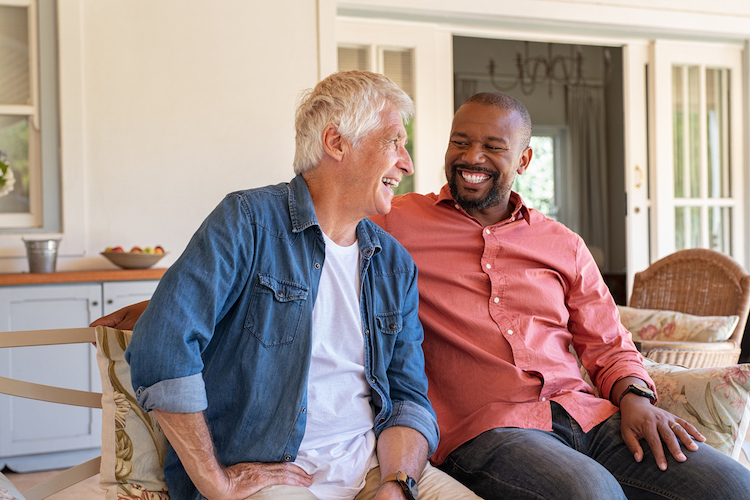Letting go of an old friend is deeply painful, but you can survive it and move on.

If you’re facing the heartbreak of a friendship break-up after 60, it can feel like the ground is crumbling beneath you. It’s not just the loss of a companion—it’s the loss of shared memories, trusted support, and someone who knew you through life’s changes. At this age, starting over socially can seem daunting, especially when you thought this bond would last forever. The emotional weight can be overwhelming, leaving you questioning your judgment, your worth, and even your ability to form meaningful connections again.
But even though it hurts, you can move forward. You’re not alone in feeling this way, and there are practical steps that can help you heal and rebuild your emotional landscape. These 15 survival strategies are designed to support you during this deeply personal transition, offering comfort, clarity, and hope. With time, self-compassion, and a bit of courage, you can come out the other side feeling more resilient, more self-aware, and surprisingly open to new beginnings.
1. Cut ties completely before the hurt goes deeper.

When a friendship has turned toxic or irreparably distant, it’s easy to keep hoping for resolution. But staying connected out of habit or guilt can prolong your pain. Every lingering text, social media peek, or small attempt to rekindle what’s gone only deepens the wound. It keeps you mentally anchored to a relationship that no longer feeds your soul. Letting go might seem harsh, but it’s a necessary act of emotional self-preservation.
By severing contact, you’re allowing yourself the space to grieve and heal without constant reminders of what used to be. You’re also giving yourself a clean break—a chance to rediscover who you are outside of that friendship, according to Julia Hubbel at Sixty And Me. Creating emotional distance helps clear the fog and makes room for healthier, more nurturing relationships down the road. You deserve peace, and that often begins with walking away completely.
2. Don’t bottle up your feelings—vent to someone you trust.

Suppressing your emotions might feel like the strong thing to do, but emotional pain doesn’t just disappear when ignored. It burrows deeper, manifesting in anxiety, resentment, or even physical illness. One of the most healing acts you can do is open up to someone you trust. Whether it’s a family member, a sibling, or a longtime confidante, choose someone who can listen without judgment or unsolicited advice.
Talking through the break-up helps validate your feelings and gives you a chance to hear your own thoughts out loud, as stated by Honey in her website. It’s not about blaming or dramatizing the situation—it’s about letting yourself feel seen and supported. Being able to express your sadness, anger, or confusion in a safe space is a vital step in making peace with what happened and gradually finding clarity in the chaos.
3. Accept that friendships change as you get older.

It’s one of the hardest truths to swallow: not every friendship is built to last a lifetime. People evolve, and so do their needs, perspectives, and life paths. What bonded you in your thirties or forties might no longer feel relevant in your sixties. This doesn’t necessarily mean that the friendship was false or unworthy—it just means it served its purpose during a particular season of your life.
Accepting that change is natural doesn’t erase the pain of loss, but it does soften the blow. It reminds you that endings aren’t always failures—they’re sometimes just the natural course of life unfolding. Letting go of the idea that every connection must be permanent can free you to appreciate the moments you did share without clinging to what no longer fits, as mentioned by Galina Hitching at Science of People. Your growth and well-being matter, even if that means outgrowing someone you once loved deeply.
4. Avoid rehashing old memories—it’ll only make you feel worse.

The past can be a comfort, but it can also be a trap. When you’re hurting, it’s tempting to replay every laugh, every road trip, every deep conversation in your mind. But those warm memories can quickly morph into regret or longing, making the pain feel sharper. Clinging to the “good old days” can stall your healing and keep you from embracing the present.
Instead, try anchoring yourself in the now. What are you learning from this experience? What have you discovered about your emotional needs and boundaries? You don’t have to erase the past, but it helps to stop living in it. Moving forward means acknowledging the good without letting it romanticize or justify a friendship that no longer serves you.
5. Reconnect with other old friends—they miss you too!

It’s easy to feel like your entire social world crumbled when one close friend disappears. But chances are, there are other people from your past who still care about you—maybe even waiting to hear from you. Reaching out to rekindle old connections can feel awkward at first, especially if it’s been years, but you might be surprised how quickly the bond can reignite.
Sometimes we overlook these quieter friendships because they weren’t as intense or central as the one we lost. But those steady, loyal people in your life can offer incredible support and warmth. Even a simple phone call or message can pave the way to renewed closeness. In reconnecting with others, you remind yourself that your story isn’t over—it’s just unfolding in a new direction.
6. Focus on new hobbies to fill the void.

When a friendship ends, the empty space it leaves behind can feel enormous. Suddenly, you have free time that used to be filled with phone calls, outings, or shared routines. Rather than letting that space become a breeding ground for sadness, turn your attention toward something that sparks curiosity or joy. This is the perfect moment to explore new hobbies or revisit interests you once loved.
Trying something creative or immersive—like gardening, dance, pottery, or even joining a local book club—can bring surprising fulfillment. Not only do hobbies keep your mind engaged, but they also offer opportunities to meet new people and build fresh connections. Filling your life with meaningful activities is a powerful way to reclaim your sense of purpose and rebuild a rich, rewarding routine.
7. Don’t blame yourself for the break-up—it takes two.

When a cherished friendship ends, it’s natural to comb through every detail wondering what you could’ve done differently. Self-reflection is healthy, but self-blame is toxic. Friendships involve two people with separate emotions, behaviors, and responsibilities. Even if you made mistakes, the burden of the break-up doesn’t rest solely on your shoulders.
By acknowledging that both of you contributed to the dynamic, you allow room for compassion and personal growth without falling into guilt. This mindset helps you examine patterns and boundaries without punishing yourself. Letting go of blame isn’t about denying responsibility—it’s about giving yourself grace as you navigate the difficult terrain of human relationships.
8. Resist the urge to badmouth your ex-friend.

When you’ve been hurt, it’s tempting to vent your frustration by talking negatively about the friend who let you down. But while it may feel momentarily satisfying, it ultimately keeps you tethered to the conflict and prevents you from truly moving on. Speaking harshly about someone, even if they wronged you, adds more bitterness to your emotional load.
Instead, try to express your feelings in private spaces where healing—not drama—is the goal. Journaling, therapy, or open-hearted conversations with trusted loved ones can provide the relief you seek without spreading negativity. Choosing to take the high road not only protects your peace but also strengthens your integrity in a season where grace is especially needed.
9. Surround yourself with positive people who lift you up.

After losing a meaningful friendship, it’s crucial to reassess the kind of energy you’re allowing into your life. Seek out people who see you, appreciate you, and make you feel emotionally safe. Being around uplifting individuals helps restore your sense of value and reminds you that there’s still a place for deep, meaningful connection in your life.
You don’t need a large circle—just a few authentic companions who bring light to your day can make a world of difference. Whether it’s family, old acquaintances, or even new neighbors, prioritize those who offer joy, not drama. Surrounding yourself with positivity is like giving your emotional immune system a much-needed boost.
10. Allow yourself to grieve—it’s a real loss.

Friendship break-ups don’t always get the recognition they deserve as significant losses, but they can be just as devastating as romantic ones. You’ve lost a part of your emotional foundation—someone who knew your stories, celebrated your wins, and stood by you in hard times. That kind of loss deserves to be grieved, fully and honestly.
Give yourself permission to cry, feel angry, or sit in quiet sorrow without rushing the process. Mourning the end of a friendship is a healthy, necessary step toward healing. Just like any other grief, it will come in waves, and your only job is to ride them with compassion. Over time, the intensity will ease, and your heart will begin to make peace with what’s gone.
11. Find comfort in solitude—learn to enjoy your own company.

In the wake of a friendship break-up, solitude can feel like punishment. But there’s something quietly powerful about learning to be content on your own. Embracing solitude means shifting the focus inward—reconnecting with your own thoughts, interests, and rhythms without the influence of others.
Take this time to nurture your inner world. Go for walks, write in a journal, watch films you love, or simply sit in silence with a cup of tea. The more you learn to enjoy your own company, the stronger and more self-assured you become. Loneliness may visit, but it won’t define you when you find peace within yourself.
12. Don’t stalk them on social media—it’ll only drag you down.

Social media can be a tricky space after a friendship ends. Seeing pictures, posts, or updates from your former friend can stir up fresh waves of hurt and confusion. It’s easy to misinterpret their curated images and assume they’ve moved on without you, adding salt to the wound.
Instead of torturing yourself with updates, take control of your feed. Unfollow, mute, or even block if that’s what it takes to protect your mental health. Curate your online space to reflect what brings you hope, humor, and healing. You’re not being petty—you’re being proactive about your recovery and peace of mind.
13. Reassess your boundaries to avoid future heartbreak.

Every relationship teaches us something, and a break-up often highlights areas where boundaries were too loose or unclear. Take time to reflect: Did you allow behaviors that hurt you? Were your needs consistently unmet or dismissed? What signals did you ignore? These questions aren’t about blame—they’re about insight.
By reevaluating your personal boundaries, you equip yourself for healthier future friendships. Learn to recognize red flags earlier, communicate your limits more clearly, and prioritize mutual respect. Strong boundaries aren’t walls—they’re guidelines for the kind of love and care you deserve. The next time around, you’ll be wiser, more confident, and better protected.
14. Don’t rush into new friendships out of loneliness.

When we’re hurting, the urge to replace a lost connection can be strong. You may feel tempted to reach out to acquaintances or new people in hopes of recreating what you had. But loneliness can cloud your judgment and lead you into friendships that lack depth, balance, or authenticity.
Give yourself time to heal before opening your heart to new people. Let your next friendships develop organically, based on genuine connection rather than emotional urgency. Building meaningful relationships takes patience, and you’re worth waiting for the right ones. In the meantime, continue nurturing your own spirit so that you enter your next connection whole, not wounded.
15. Seek professional support if you’re struggling to move on.

Sometimes the pain doesn’t ease on its own, no matter how hard you try. If you’re feeling stuck, overwhelmed, or depressed, talking to a therapist can offer immense relief. Professional support gives you a safe space to unpack your emotions, gain perspective, and receive strategies that help you move forward.
There’s no shame in seeking help—especially when your emotional health is at stake. Therapy can guide you through the complex layers of grief, attachment, and self-worth that a friendship break-up can surface. With the right support, you’ll not only heal—you’ll grow stronger, wiser, and more resilient for the road ahead.
